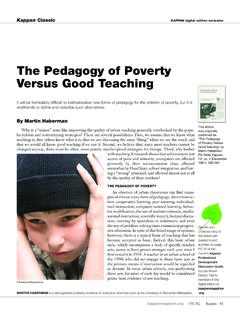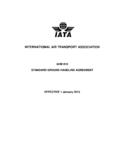Transcription of Myths and Stereotypes About Native Americans - IMPak
1 Myths and Stereotypes About Native Americans Most non-Indians don't know a great deal About the first peoples of the Americas, Mr. Fleming avers. But what's worse is that much of what they do know is wrong. BY WALTER C. FLEMING. HEN IT comes to Americans '. W. knowledge About Native Amer- ican1 culture and history, one might say there are two types of people those who know nothing About natives and those who know less than that. That's not exactly true, but most Amer- icans are not very familiar with the first peoples of the Ameri- cas. Though some might argue that it is wholly unneces- sary to have any knowledge About Native peoples, most would probably agree that some exposure to Native per- spectives is a good thing for students. And Americans prob- ably believe that it is the responsibility of the public educa- tion system to provide that exposure.
2 Because many people have such a limited knowledge quite negative. In fact, in states like Montana, the expres- of Indians, we are, arguably, among the most misunder- sion familiarity breeds contempt is descriptive of the ten- stood ethnic groups in the United States. Native Americans sions between Native and non- Native people. are also among the most isolated groups. Thus the knowl- Stereotyping is a poor substitute for getting to know in- edge that most people have About Indians does not come dividuals at a more intimate, meaningful level. By relying from direct experience. What people know is limited by their on Stereotypes to describe Native Americans , whites come sources of information and, unfortunately, much of the to believe that Indians are drunks, get free money from the information About Indians is derived from popular culture.
3 Government, and are made wealthy from casino revenue. Even in areas where the concentration of Native peo- Or they may believe that Indians are at one with nature, ples is high say, in the West most people do not know deeply religious, and wise in the ways of spirituality. very much About the history and culture of the first citizens I do not intend to dispel all of the Stereotypes or address of their region. Even if non-Indians are familiar with Indi- all of the many Myths About Native peoples; instead, I'd ans, the impressions they have of Native people can be like to offer my perspective on the most important consid- erations that teachers and others might keep in mind when WALTER C. FLEMING (Kickapoo) is a professor and head of the assessing curriculum, developing lesson plans, or teaching Department of Native american Studies at Montana State Uni- versity, Bozeman, and author of The Complete Idiot's Guide to Indian children.
4 Many of these Myths may seem ridiculous, Native american History (Alpha, 2003). even silly, but each one is encountered by Native people NOVEMBER 2006 213. on an almost daily basis. identity in America. Certainly, there are common points Myth 1. Native Americans prefer to be called Native About the use of terms like Hispanic, Asian Americans , Americans . One of the most significant conversations with African Americans , and so on that can be productive in students seems to be the most basic. The first question peo- trying to understand this creature called american .. ple often ask me, as a Native person, is, What do you Myth 2. Indians get special privileges. One stereotype want to be called? Often, this is asked in the interest of strongly held in Indian Country2 by non-Indians is that In- political correctness, but as often it is a sincere question.
5 Dians receive special privileges that other american citi- There are several choices including Native american , zens do not. The 7 June 2006 electronic edition of the Find- american Indian, and Native and good arguments lay (Ohio) Courier shared this editorial opinion: for, or against, using any one of these. It's long been apparent that the laws granting Na- Native american seems to be the preference in aca- tive american tribes sovereign nation status were a demic circles. In my own writing or lectures, I am accus- huge mistake. Rather than improving the lives of na- tomed to using Native american in reference to the first tive people, the laws have created a state of depend- peoples of this country (although in conversation I'm more ency in which the tribes are neither truly sovereign nor fully a part of the larger nation.)
6 They are essen- likely to use american Indian or Indian ). I am unapol- tially wards of the federal government. They receive ogetic in my use of these terms and don't find it necessary some special privileges designed to advance their to spend lots of time (save in this article) explaining to others welfare or maintain their Native culture, but for the why I do, or do not, use one term or another. most part, the laws have made dependent victims of american Indian and the shortened version, Indian, people who should have been integrated into the larg- er culture. have long been the subject of debate. Some natives point out that the term Indian is an unhappy legacy of Christo- The editorial concluded, We've foolishly allowed the pher Columbus' so-called discovery and that the term is, Native Americans special tribal privileges, which has bene- therefore, a legacy of the subsequent colonization of the fited neither them nor the nation as a whole.
7 3. lands of the Native peoples of the Americas. The Courier editorial did not describe what those spe- In Canada, the term most widely used to describe abo- cial tribal privileges might be. But from long experience, riginal people is Native . Again, as with Native Ameri- I can surmise that the writer meant education, medical care, can, one can argue that we are all natives of our respec- and money, all for free. Moreover, many believe that Native tive countries of affiliation. peoples do not pay taxes. This discussion does not have any resolution. We, as Na- The reality is more complicated, and these assertions tive people, are quite schizophrenic About it ourselves. In are based upon half-truths. Suppose it is true that natives my own case, I'm likely to use Native , Native american , receive financial support for education.
8 According to re- Indian, and american Indian quite interchangeably, some- cent data, 63% of all undergraduate students in the United times even in the same sentence. States received financial aid in the form of scholarships, But all of these terms have one thing in common. They grants, subsidized loans, and The majority of imply that there is some meaning to be derived from the these students are, in fact, non-Indians. Yet no one claims term of choice, whatever that might be. For example, the that these non-Indian students are getting a free educa- terms american Indian jewelry or Native american re- tion.. ligion in reality do not convey much information About Native students qualify for these same sources of fund- more than 500 cultural beliefs or practices.
9 Does Euro- ing. They may receive scholarships from their tribes or, as pean suggest a common history, culture, or desire? Does low-income students, qualify for federal Pell Grants. Some Asian mean that all those rich traditions can be so easily states offer fee waivers to Native students, but they also described? offer similar waivers to medical students, war orphans, sen- As much as possible, I try to use tribal names, when ior citizens, dependents of prisoners of war, National Merit known. Thus Squanto and Massasoit were Wampanoag Scholarship semifinalists, and so on. The public seems to leaders, and Sitting Bull was Hunkpapa Lakota. Though accept the propriety of granting waivers to children of Viet- they can be referred to as Indian leaders, common sense nam veterans but calls Indian fee waivers special privi- suggests that these individuals had little in common.
10 Leges. It is understandable then that many natives consider Educators speak often About teachable moments. Per- the protests About these so-called special privileges to be haps the discussion About what terms to use in reference based on race. to Native peoples can be part of a wider discussion About Those who are concerned About special privileges do 214 PHI DELTA KAPPAN. not understand the nature of the relationship between Na- more other races, live on reservations or other trust This tive tribes and the american federal government. Tribes also includes those who live on historic Native lands in Ok- signed treaties with the federal government that grant cer- lahoma and state reservation lands. In all, 57% of Ameri- tain rights in exchange for the cession of land.





